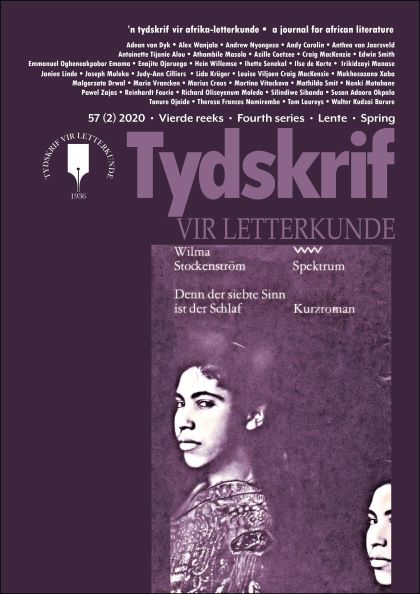Winterbach’s Spyt and Scholtz’s production: An expression of a postmodern impasse
DOI:
https://doi.org/10.17159/tl.v57i2.7950Keywords:
Brink Scholtz, Ingrid Winterbach, metamodernism, postmodernism, Spyt, surfacesAbstract
Some scholars have declared metamodernism to be postmodernism’s successor, and Afrikaans novelist Ingrid Winterbach’s work has been argued to be an example of this distinct move away from the postmodern paradigm. However, in this article I present the alternative interpretation that Winterbach’s play, Spyt (Regret), rather represents postmodernism’s inability to give way to its successor. An investigation from a postmodern perspective leads me to conclude that, in both the text and performance of this play (directed by Brink Scholtz), an escape from the postmodern paradigm entails the end of all representation. Winterbach reduces all of the characters’ endeavours to surfaces which become parodies. All their experiences are commodified and any attempt at uncovering a deeper meaning to life is undermined by ridicule. Winterbach furthermore draws attention to some of her characters’ limited vocabulary and reliance on English loanwords. This culminates in a powerful scene where the loanword ‘awesome’ is repeated to the extent that it becomes simultaneously meaningless and indispensable; a tension that she does not resolve. In addition, the crossing of the boundary between life and death, which has been described as postmodernism’s final frontier, is portrayed by relying on an obsolete narrative. The play therefore suggests a postmodern impasse, rather than a move towards a new paradigm. an a move towards a new paradigm.
Downloads
References
Barry, Peter. Beginning Theory. Manchester U P, 1995.
Bezuidenhout, Andries. “‘Spyt’ by Aardklop.” Versindaba. 7 Oct. 2010. https://versindaba.co.za/2010/10/07/spyt-by-aardklop/.
De Villiers, Johannes. “Swart-wit-vryery laat kykers loop.” Rapport, 3 Oct. 2010, p. 3.
Eco, Umberto. Interpretation and Overinterpretation. Trans. S. Collini. Cambridge U P, 1992.
Eco, Umberto. Postscript to The Name of the Rose. Trans. W. Weaver. Harcourt Brace Jonovich, 1983.
Human, Thys. “Die gul applous van lewende wesens.” Die Burger, 5 Oct. 2013, p. 9.
Hutcheon, Linda. The Politics of Postmodernism. Routledge, 2002.
Leeming, David. “Acheron.” The Oxford Companion to World Mythology. Oxford U P, 2006. https://www.oxfordreference.com/view/10.1093/acref/9780195156690.001.0001/acref-9780195156690-e-7?rskey=7YELOy&result=1.
McHale, Brian. Constructing Postmodernism. Routledge, 1992.
Rayner, Alice. To Act, To Do, To Perform. U of Michigan P, 1994.
Roberts, John. (ed.) “Styx.” The Oxford Dictionary of the Classical World. Oxford U P, 2007. https://www.oxfordreference.com/view/10.1093/acref/9780192801463.001.0001/acref-9780192801463-e-2100.
Scholtz, Brink. Interview with Murray LaVita. Die Burger, 4 Sep. 2010, p. 8.
States, Bert O. Great Reckonings in Little Rooms: On the Phenomenology of Theater. U of California P, 1985.
Steinmair, Deborah. “‘Spyt’ kort tóg ’n bietjie tyd.” Spat, appendix to Beeld, 29 Sep. 2010, p. 8.
Van der Merwe, Joanette. “Notes towards a metamodernist aesthetic with reference to post-millennial literary works.” Diss. North-West U, 2017. http://hdl.handle.net/10394/25443.
Vermeulen, Timotheus & Robin Van Den Akker. “Notes on Metamodernism.” Journal of Aesthetics and Culture vol. 2, no. 1, 2010. DOI: https://doi.org/10.3402/jac.v2i0.5677.
Watson, Nigel. “Postmodernism and Lifestyles.” The Routledge Companion to Postmodernism, edited by Stuart Sim. Routledge, 2011, pp. 55–61.
Winterbach, Ingrid. Die aanspraak van lewende wensens. Human & Rousseau, 2012.
Winterbach, Ingrid. Die benederyk. Human & Rousseau, 2010.
Winterbach, Ingrid. Die boek van toeval en toeverlaat. Human & Rousseau, 2006.
Winterbach, Ingrid. It Might Get Loud. Trans. M. Heyns. Human & Rousseau, 2015.
Winterbach, Ingrid. Spyt. 2010. Microsoft Word file.
Winterbach, Ingrid. The Book of Happenstance. Trans. D. & I. Winterbach. Human & Rousseau, 2010.
Winterbach, Ingrid. The Road of Excess. Trans. L. De Kock. Human & Rousseau, 2014.
Zima, Peter. The Philosophy of Modern Literary Theory. Athlone, 1999.
Downloads
Published
Issue
Section
License
Copyright (c) 2020 Tydskrif vir Letterkunde

This work is licensed under a Creative Commons Attribution-ShareAlike 4.0 International License.


 https://orcid.org/0000-0001-6465-6584
https://orcid.org/0000-0001-6465-6584


.png)